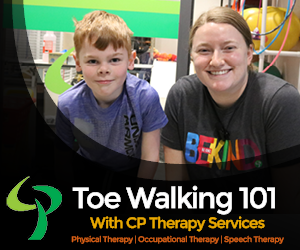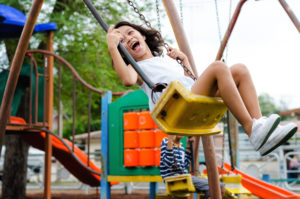[Sponsored Post from Prevea Health]
Have you ever wondered why your baby does certain things? Why do they suck on their toes? Why do babies rock back and forth on their hands and knees? Why did he or she say “Da da” first? Why are they called the “terrible twos”? Development!
Development is an amazing process that your child experiences, but it doesn’t just happen. And, you can be involved to help them move through development successfully!
Let’s start with what development is. Development is the process that children work through to enhance their body movements, senses, motor planning, ability to care for themselves and their emotions. While we are born with the basic parts, it takes years of learning to become a successful adult (and truthfully, it is a lifelong process). Most children will follow a relatively similar developmental pattern although the experiences and environment we provide our children can greatly impact how well our children thrive. Giving your children a variety of learning patterns and experiences can change how rapidly or slowly your baby moves through stages. That being said, every child also moves at their own pace so this is the opportunity to learn with your child on how they best learn and like to learn.
How do children develop? Children learn through their senses of sight, taste, smell, hearing and touch. We additionally have senses such as proprioception (our knowledge of where we are in space), pain, balance, etc. Infants are born with their strongest senses being hearing and touch. Babies can recognize their parents’ voices and are exceptionally receptive to touch. They have strong reflexes built in to help protect their movements as well as certain life skills such as the rooting reflex which encourages them to turn their head to eat. As children learn, they will use their senses to help. When your child puts things in their mouth (hello, babyproofing stage!), they are actually using their mouths to establish what the item is such as texture. At different times of their lives, your child relies on their senses differently to teach them about their world.
Children will often be assessed at their well child visits with a developmental checklist. This is a great opportunity to look at how your child is developing and recognize where their strengths are and where they have room to improve. Quite often you will find that at times, your child is working through one stage of development (perhaps crawling or walking) and seemingly limited in another (talking). It is quite common for children to fluctuate between the areas of development, concentrating on certain areas, but hopefully always making a forward progression. When you have concerns, bring them up at your appointments! You know your child best and it’s really the best way for your provider to understand where your child is at with development.
So, why do babies put their feet in their mouths? It integrates their reflexes in their feet to decrease the sensitivity while working on abdominal strengthening and learning about the symmetry of their body. Why do babies rock on hands and knees? They are preparing for forward movement by strengthening their core and the bigger muscles in their shoulders and hips. Why do they typically say “Da da” first? It’s the easier mouth position for them to articulate and the “D” sound often comes before the “M” sound in language. And about those “terrible twos”…it’s most often experienced with your child’s receptive language (the part of communication that they understand and know) is stronger than their expressive language (the part of communication that they are able to speak).
Take the opportunity to enjoy each stage of development and think of it like learning the chapters of your child’s book. Each one is different, unique and perfectly your child!
Also, if you’d like to learn more about introducing certain foods to your baby, you are invited to attend a FREE, Learn & Play with Baby class from Prevea Therapy! Let’s Eat will be held on Tuesday, May 21st at Prevea Therapy (1601 Lawrence Drive in De Pere) from 10-11AM. At this class, one of Prevea’s Speech-Language Pathologists will present methods and tricks for making baby’s introduction to food more successful. Register online here.
By: Elizabeth Waerzeggers, MPT

Elizabeth is a pediatric physical therapist who’s been working with Prevea Therapy and HSHS St. Vincent Children’s Hospital since 2002. She is a wife and mother of three with a passion for working with children and helping them find their wings.








